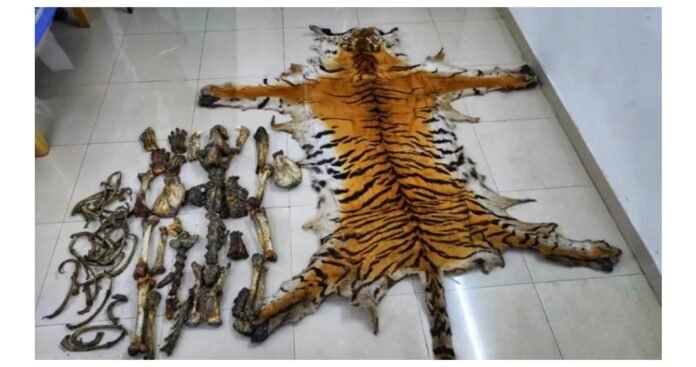Guwahati
In a major breakthrough, officials from the Directorate of Revenue Intelligence (DRI) apprehended three individuals with tiger skin and bones near Itakhola, a region situated in Sonitpur district. The arrest has raised concerns over the rampant wildlife trafficking in the region and highlights the ongoing efforts to combat this illegal trade.
Acting on specific intelligence inputs, the DRI officials conducted a well-coordinated operation in collaboration with local law enforcement agencies. The joint team intercepted a vehicle suspected to be carrying contraband wildlife products. Upon searching the vehicle, they made the shocking discovery of a tiger skin and a substantial quantity of tiger bones.
The individuals, whose identities have been withheld pending further investigation, were promptly taken into custody. Preliminary findings suggest their involvement in a larger network engaged in illegal wildlife trafficking. The confiscated tiger parts are believed to be linked to a highly organized syndicate catering to the demand for such products in the black market.
Tigers, an endangered species protected under national and international laws, face a constant threat from poaching and the illegal wildlife trade. The demand for tiger parts, driven by superstitions and beliefs associated with their alleged medicinal properties, continues to pose a significant threat to their survival.
Authorities, wildlife conservation organizations, and law enforcement agencies have been working tirelessly to combat this menace. The successful operation by the DRI underscores their commitment to curbing wildlife trafficking and protecting the country’s rich biodiversity.
The seized tiger skin and bones will undergo forensic examination to gather crucial evidence for the ongoing investigation. The authorities aim to uncover the entire network involved in the illicit trade and ensure that all those responsible are held accountable under the law.
Wildlife trafficking not only threatens the existence of endangered species but also has serious environmental and ecological repercussions. The illegal trade destabilizes ecosystems, disrupts biodiversity, and fuels organized crime.
The latest arrest near Itakhola serves as a reminder of the persistent challenges faced in combating wildlife trafficking. It emphasizes the need for increased vigilance, stronger enforcement measures, and public awareness campaigns to deter individuals from participating in this illegal trade.
The authorities have called for stricter penalties and enhanced international cooperation to combat wildlife trafficking effectively. They have urged citizens to report any suspicious activities related to wildlife crime and play an active role in conserving and protecting the precious natural heritage of the region.
As the investigation progresses, authorities remain committed to dismantling wildlife trafficking networks and preserving the fragile balance of nature. The arrest near Itakhola stands as a testament to their resolve in safeguarding the magnificent wildlife that graces the Assam-Arunachal border and beyond.


